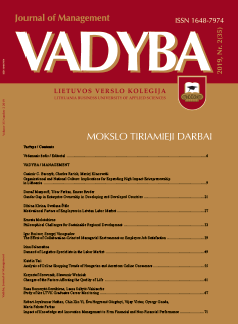OPPORTUNITIES OF THE CRM CONCEPT IN CREATING PROCESS OF A VALUE-BASED TOURISM PRODUCT
OPPORTUNITIES OF THE CRM CONCEPT IN CREATING PROCESS OF A VALUE-BASED TOURISM PRODUCT
Author(s): Daiva Labanauskaitė, Deimena KiyakSubject(s): Tourism
Published by: Lietuvos verslo kolegija
Keywords: tourism; CRM concept; value-based tourism product; creating of tourism product; opportunities of the CRM concept;
Summary/Abstract: The modern tourism is to combine with new trends in customer behaviour and new expectations. The consumer of tourism services has evolved from being a rational, thinking of the future to an emotional consumer with big needs, dreaming of a “good life”. There is a shift from lower-class consumption habits to higher-class consumption. The modern tourist is expecting a personalized offer of a tourism product. It is a big challenge for the providers of tourism services to offer a tourism product as a “commodity of experience”, which is acquired by those who transform their experiences into memories and build on them for further decisions. The problem of the scientific discussion in this is article is concentrated on the theoretical opportunities to customize CRM tools in the in the value creating process of a tourism product offered by small tourism service providers. The aim of the article is to identify benefits and risks of a CRM concept in creating process of a value-based personalized tourism product offered by small tourism service companies. The scientific literature describes CRM in various ways – as a business philosophy (building a customer-oriented culture and building long-term customer relationships), as a business strategy (functional plans and actions to build customer relationships) and as a technological tool (using information technology for data collection, analysis and customisation through customer relationship management). CRM is also described as a method that requires software and technology that automates the company's business processes related to sales, marketing and customer service. Increasing access to information systems and falling prices for computer programs improve customer relationships in today's travel industry. From a strategic perspective, CRM is an organisational process that enables a company to measure customer's margin and manage customer relationships, thereby improving the company's profitability. Using information technology solutions and building a customer information base simplifies the customer relationship management process. CRM as a new described as a new management mechanism to improve corporate-customer relationships that can be applied as technical support in the marketing, service and other customer-related areas of the tourism business so that customers always feel supported by service personnel and business will keep abreast of changes in customer needs. This encourages tourism companies to make the most of its available resources for customer interaction and to achieve management of travel choices from tourist flows, marketing and technical support, and mutual evaluation management. Tourism companies should develop data collection technique, as this technique can help them develop marketing strategies and maximise the organisation's profits. Tourism companies should collect huge amounts of customer data that can be integrated into databases and are used to make marketing decisions about them. Tourism companies can monitor customer purchasing behaviour by using the submitted process to analyse the data collected. This helps tourism companies personalise marketing solutions and offers to match the preferences of different customers. Tourism companies can maintain regular customers, stop the transition of the most profitable customers to competitors, classify their preferences and influence the prices of short-term services, thereby optimising profitability. In the tourism product development process, the aim is to strengthen user orientation, thus increasing the value of the tourist product for the consumer, the CRM application can be seen as a strategic use of customer data by integrating them into the loyalty scheme, using information technology. Improvement programmes of organisations are constantly evolving, taking into account the new possibilities of information technology in business processes, which can also be attributed to CRM. Proper use of information technology can help maintain customers through more efficient customer relationship management, based on knowledge and strong interaction.
Journal: VADYBA
- Issue Year: 36/2020
- Issue No: 1
- Page Range: 77-83
- Page Count: 7
- Language: English

